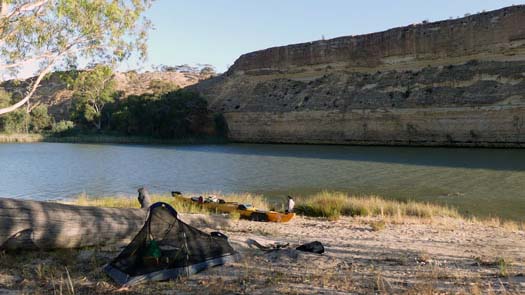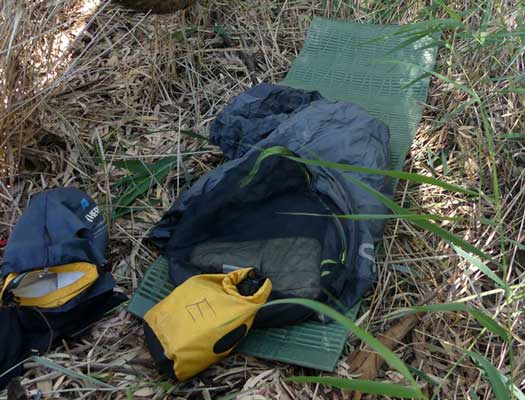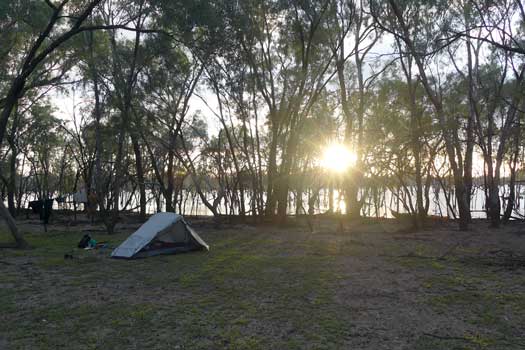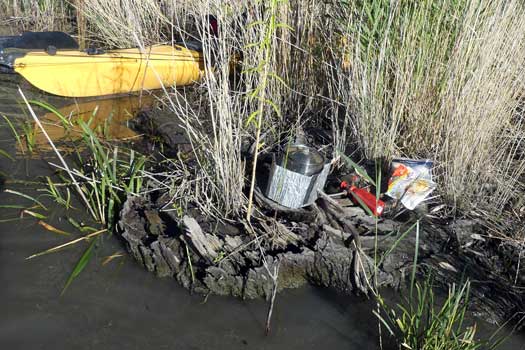Laws and Regulations
Find out what these are before you leave!

While you should always aim for public or private campgrounds, sometimes you are forced to look at other options. This will either mean sleeping in your kayak or trespassing on private property. So what things can you do to reduce the chances of being forced to move on by an irate landowner?
The first thing to do is to approach the landowner if you can find them. Be polite and courteous and many will allow you to set up for the night. Explain that you are only paddling past and that you only need a small amount of space to camp for a night and that you will be quiet and be gone first thing in the morning.
If you can't get hold of any landowners down a particular stretch of the river, you will have to be forced to camp without permission and risk being asked to leave or even face a run in with a police officer or security guard. So a few tips to make help you get through the night undisturbed.

I carry a small black bivy and my main tent that has a green fly. Both colours are neutral enough to blend in with the various locations. I will use my tent if I can find an area large enough and is hidden from view. I'll use my bivy if camping where I expect to be discovered (i.e. marina, boat ramp, park) or when it will allow me to keep low such as a camp with only long grasses to hide your presence. Sometimes you simply can not find anywhere large enough to set up a tent!
A thick tent footprint will allow you to minimise the impact that you do at the campsite. This will allow you to avoid having to overly clear a site before pitching your tent. I have taken this one step further and I use a large foam sleeping roll that I place this outside under the tent. I can happily sleep on nearly anything with only having to move large sticks and branches!
A gas cooker should be carried, as making a fire is a sure way of alerting a landowner to your presence and most landowners will not look favourably on you if you do this. Sometimes you simply couldn't even light a fire even if you wanted to!
Avoid brightly coloured camping gear. You really don't want this to stand out! Note, this is the opposite of what you want with your paddling gear where the extra visibility could save your life one day.

If you see No trespassing signs, move on. This landowner has clearly had issues in the past and could be actively monitoring their property. They will almost certainly ask you to move on or to call the police.
I try to find the most secluded spot that is away from the direct line of sight of any nearby houses, roads and other areas that could be frequented. Aim for areas that are unlikely to be visited. The more appealing the riverbank looks, the more likely it will be visited by someone fishing or going for a walk. Finding a weedy corner by the river between a couple of paddocks is far less likely to be visited.
I prefer to be at least 500 m away from houses when in thick bush or woodlands or 1-2 km away in more open areas. This helps to minimise the chances of being seen or visited.
Also ensure that you can follow the principles of not leaving any trace meaning that you shouldn't be having to do any clearing or earthworks to set up your tent! You don't need a perfectly level site, learn what slopes you can comfortably sleep on prior to any trips that may require less desirable campsites.

Most kayakers follow the sun, sleep just after sunset and up at or just before dawn. When covert camping, this has the advantage of that you will minimise the chances of being visited by the landowners. It also removes the need to use touches at night that will stand out. If you are forced to use a touch, try to minimise how bright it is by shining it through a t-shirt and to ensure it points downwards.
When you first arrive at an open site, walk around the edges to see if you can see houses or tracks close to the camp. This will give you an indication if you are truly in a secluded sport or if you are likely to get visited in the night. After this initial look around, stay close to the campsite.
Stage your night into phases. I will often spend 5 to 10 minutes at a spot just writing my journal or chilling to get a feel for the site. If anyone walks up you can honestly state you are just having a quick rest and you can ask then if it is ok to throw up a tent as you are finding it difficult to find places to camp!
In less secluded spots, have dinner by taking out only what you need to cook and eat it. Even consider going stoveless for the night if you have some couscous meals or similar. Don't spread out your gear and make it look like your planning to settle down for a week or two! If you know you are going to end up somewhere very public, even cook and eat your meal before even arriving at the planned campsite.
By the time you have finished eating, it is likely getting towards sunset and you will be able to quickly set up your tent and have minimal risk of visitors. Pull up or moor your boat where it isn't obvious to people passing by. I prefer to drag my kayak up into long grass right beside my tent if possible. Repack all of your cooking gear and only unpack what you need for the night. Get up early and plan to leave shortly after first light.
Be respectful to the unseen owners by being quiet and by following the Leave No Trace principles, again emphasising that you shouldn't be lighting any fires.
©2026 Alan Davison // Credit // Disclaimer